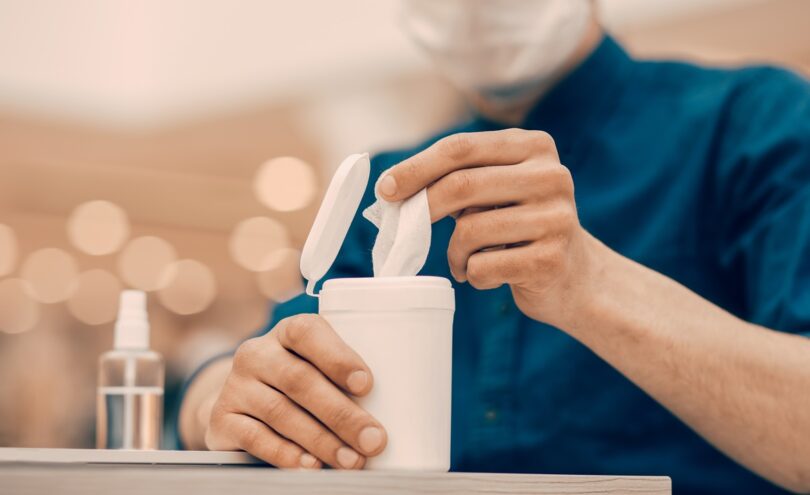Antiseptic wipes are a must-have item for first aid kitsas they plays a vital role in cleaning and sterilising wounds. These single-use wipes kill bacteria and germs instantly without soap or water, resulting in quick wound healing. No wonder they find their space in every small/medium-risk workplace such as offices, workshops, factories, and warehouses.
However, it is worth noting that there are a variety of wipes that work differently from antiseptic wipes. So, lets dive in and shed some light on why your business needs antiseptic wipes in the workplace first aid kit arsenal, the different types of wipes and how to choose the right one.
We’ll also discuss how to useantiseptic wipes to treat any wound safely. If you are planning to restock wipes for your facilities, continue reading to know which makes the perfect fit.
Antiseptic wipes: Health and safety must-haves in the workplace
Let’s be frank – most of us are scared of cleaning wounds because more often than not, the wipes or ointments lead to a tingling or burning sensation.
However, antiseptic wipes offer a perfect solution. These wipes instantly kill bacteria and germs, clean open wounds and the surrounding skin, and reduce pain and the chances of infection.
Moreover, antiseptic wipes are also used for cooling, soothing, and disinfecting insect bites. Be it a red and inflamed mosquito bit, or an unpleasant bee sting, it’s safe to use an antiseptic wipe to clean the skin and relieve the pain and itchy sensation.
The best thing aboutantiseptic wipes is that they are gentle and don’t sting, which makes it easier to keep your wounds clean. Additionally, antiseptic wipes can do more than just cleanse open wounds; they are also used to remove dirt or residue from your hands.
Finally, you can also use antiseptic wipes to clean surfaces such as the car seat, dashboard, knobs, and other high-touch surfaces in your workplace to prevent the transfer of germs and remove any organic debris.
Why are antiseptic wipes important for workplace hygiene?
Antiseptic wipes are first aid kit supplies for cleaning and disinfecting minor cuts and scrapes, all of which promote quicker and natural healing processes. They can be key in workplace emergency response kits, because they enable employees to administer first aid safely and effectively.
While most people believe that antiseptic wipes only belong in first-aid pouches, that’s not quite true. Antiseptic wipes serve various functions, making them a necessity for workplaces in all industries.
Whenever you are out and about in busy public places, you will likely pick up germs and bacteria from touching many surfaces. Whenever you are in an office, shopping centre, or any other public space, consider carrying antiseptic wipes with you to use as hand sanitisers.
Antiseptic wipes are remarkably effective for killing harmful germs and keeping you and your loved ones safe from unexpected germ transfer.
Choosing the right wipes for cleaning and disinfecting your workplace
There are different varieties of wipes, all of which serve different purposes. For example, alcohol wipes are ideal for disinfecting surfaces, but they can’t be used for treating open wounds.
So, to get the most out of your wipes, ensure you are using the right type for your needs. Let’s have a look at the three main types of wipes and when they should be used.
The applications of blockchain in business security are immense, and the potential is largely untapped.
Sanitising wipes
Sanitising wipes are primarily used to clean and disinfect surfaces in healthcare facilities and food surface areas. They are designed to quickly reduce bacteria on surfaces, to prevent transmission to people in contact.
Aside from cleaning surfaces, sanitising wipes do an excellent job of disinfecting your hands. Unlike other disinfectants that can dry out your skin, sanitising wipes are skin-friendly, and thus gentle on your hands. However, do not use them on your eyes or any other openings on your body.
Disinfectant wipes
Disinfectants are primarily used to disinfect hard surfaces and are likely to find utility in hospitals, schools, public transportation, rest rooms or locker rooms. As per studies, they are ideal for removing organic debris and delivering the best disinfection activity.
Antibacterial wipes
Antibacterial wipes are suitable for eliminating germs and preventing the growth of bacteria primarily in hospitals and care homes. These wipes work by killing germs and preventing the growth of bad bacteria that can lead to serious diseases.
Additionally, antibacterial wipes are also used to inactivate viruses. However, it is important to read the product descriptions, as not all antibacterial wipes inactivate viruses.
How to use antiseptic wipes for first aid
Using an antiseptic wipe to clean and sanitise wounds is simple. Follow these steps to ensure quick healing:
- Remove one antiseptic wipe from the pack and use it to clean your hands.
- Once your hands are clean, take another wipe to use for the wound.
- Clean the wound gently without applying much pressure.
- Let the wound dry, then dress the wound.
- Dispose of the used antiseptic wipes in your rubbish bag.
Choosing the right wipes for cleaning and disinfecting your workplace
- Read the product description carefully to ensure the wipes are safe for your intended use.
- Consider the type of surface you will be using the wipes to clean. For example, wood and electronic surfaces call for different wipes.
- Before you start with a wipe, consider the type of germs you are dealing with. If your aim is to reduce the level of germs, sanitising wipes will serve you well. For complete elimination from a hard surface, use disinfectant wipes.
- Some wipes are not safe to use on the skin or hands as they contain harsh chemicals that can cause irritation. So, be sure to read the label before using any wipe.
- if you are unsure of which type of wipe to use, speak to your doctor or pharmacist to help you make an informed decision.
“The opinions expressed by BizWitty Contributors are their own, not those of BizCover and should not be relied upon in place of appropriate professional advice. Please read our full disclaimer."







